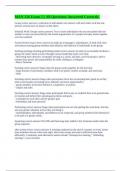MAN 336 Exam 2 || All Questions Answered Correctly.
Group correct answers a collection of individuals who interact with each other such that one
person's actions have an impact on the others
Informal Work Groups correct answers Two or more individuals who are associated with one
another in ways not prescribed by the formal organization. Ex: people who play tennis together
over the weekend.
Formal Work Group correct answers Is made up of managers, subordinates, or both with close
associations among group members that influence the behavior of individuals in the group.
forming-storming-norming-performing model correct answers in order to successfully facilitate a
group, the leader needs to move through various leadership styles over time.
- first being more directive, eventually serving as a coach, and later, once the group is able to
assume more power and responsibility for itself, shifting to a delegator
- Bruce Tuckman
Forming correct answers Stage when the group comes together for the first time
- large amount of uncertainty, members tend to be polite, conflict avoidant, and observant.
- short
Storming correct answers Stage when participants focus less on keeping their guard up as they
shed social facades, becoming more authentic and more argumentative.
- group members to become defensive, competitive, or jealous
- cliques and sides
Norming correct answers Stage when participants find it easy to establish their own ground rules
(or norms) and define their operating procedures and goals.
- committed to each other and the group's goal
- friendships and more personal
Performing correct answers Stage when participants are not only getting the work done, but they
also pay greater attention to how they are doing it.
- interdependent, individuality and differences are respected, and group members feel themselves
to be part of a greater entity.
Ajourning correct answers The fifth and final stage later added to the Tuckman model when the
group separates
after-action review correct answers A meeting conducted at the end of a project or event, where
team members discuss what went right, what went wrong, and what could have been done
differently. Commonly used alternative names include "retrospective meeting," "debriefing
meeting," or post mortem.
,punctuated equilibrium correct answers The theory that change within groups occurs in rapid,
radical spurts rather than gradually over time.
- Niles Eldredge and Stephen Jay Gould
Cohesion correct answers The degree of camaraderie within the group.
- more cohesive = more productive
- similarity, stability, size, support, satisfaction
- can be too much
Groupthink correct answers A group pressure phenomenon that creates a tendency to avoid a
critical evaluation of ideas the group favors.
- common in highly cohesive groups
social loafing correct answers The tendency of individuals to put in less effort when working in a
group context.
Collective Efficacy correct answers A group's perception of its ability to successfully perform
well.
- watching others, verbal persuasion, and how person feels
Process Loss correct answers Any aspect of group interaction that inhibits group functioning.
Team correct answers A cohesive coalition of people working together to achieve mutual goals.
- requires commitment to the vision
- smaller in size
- accomplish a larger and complex goal
- collaborative tasks
- advances of technology
Production Tasks correct answers Tasks that include actually making something such as a
building, product, or marketing plan.
Idea-generation tasks correct answers Creative tasks such as brainstorming a new direction or
creating a new process.
Problem-solving tasks correct answers Refers to coming up with plans for actions and making
decisions.
Task interdependence correct answers The degree that team members are dependent upon one
another to get information, support, or materials from other team members to be effective.
Pooled interdependence correct answers Team members work independently and combine their
efforts to create the team's output.
- divide the sections of a research paper
, Sequential interdependence correct answers In a team, when one person's output becomes
another person's input.
Outcome interdependence correct answers When the rewards that an individual receives depend
on the performance of others.
Team role correct answers effective teams divide up tasks so the best people are in the best
positions.
Task-Oriented Roles correct answers contractor, creator, contributor, completer, critic
Social-Oriented Roles correct answers calibrator, communicator, cooperator
Boundary-Spanning Roles correct answers coordinator, consul
Task force correct answers A type of temporary team that is asked to address a specific issue or
problem until it is resolved.
Product Development Teams correct answers A team in charge of designing a new product.
Cross-functional teams correct answers Teams that involve individuals from different parts of the
organization.
Virtual teams correct answers Teams where members are not located in the same physical place.
- management is hard
- communication is important
- formed on temp basis
- less transformation leadership
- out of sight out of mind issue --> free ride
- poor communication
Overcome Challenges
- meet F2F early on
- encourage communication --> video conferences
- ground rules for time sensitive communication
- everyone share leadership role
Top management teams correct answers Teams appointed by the chief executive officer (CEO)
and, ideally, reflect the skills and areas that the CEO considers vital for the company.
- reps from functional areas
Traditional manager-led teams correct answers Teams where the manager serves as the team
leader.
- assigns work




